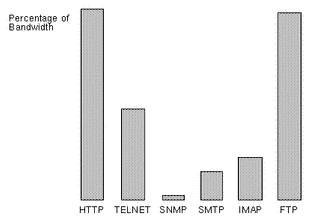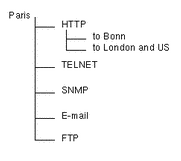Paris
Figure 3-8 Actual Network Use for Paris Site

The network users at the Paris site consider e-mail, file transfer and access to the world wide web to be the most important uses of the network. The actual usage pattern is shown in Figure 3-8.
Using the data on network use and the user input, the network administrator designed the class hierarchy shown in Figure 3-9 and assigned the priorities and percentages of bandwidth shown in Table 3-1.
Figure 3-9 Class Structure for Paris Site
 Table 3-1 Bandwidth Allocation and Priority of Classes on Paris Server
Table 3-1 Bandwidth Allocation and Priority of Classes on Paris Server|
Class Description |
Class Name |
Parent Class |
Percentage of Bandwidth Allocated |
Priority |
|---|---|---|---|---|
|
Root |
root |
|
100 |
1 |
|
http to Bonn |
http-bonn |
http |
5 |
3 |
|
http to London or US |
http-lon |
http |
10 |
3 |
|
http to elsewhere |
http |
root |
20 |
5 |
|
telnet |
telnet |
root |
30 |
1 |
|
System monitoring |
snmp |
root |
5 |
1 |
|
|
|
root |
20 |
4 |
|
File transfer |
ftp |
root |
15 |
7 |
|
Default |
default |
root |
5 |
7 |
In batool and in the configuration file, you must specify the bandwidth allocated to a class and all its descendants. For example, the http-bonn and http-lon classes are both child classes of the http class. The http class and its decendents are allocated 20% of the bandwidth, of which the child classes are allocated allocated 5% and 10%.
With this configuration, the bandwidth used by FTP traffic is constrained to 15%, contrasting with the current usage figure of over 30%
- © 2010, Oracle Corporation and/or its affiliates
